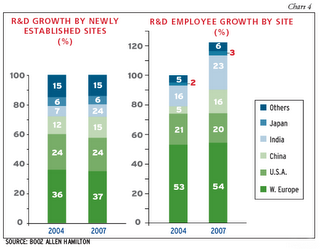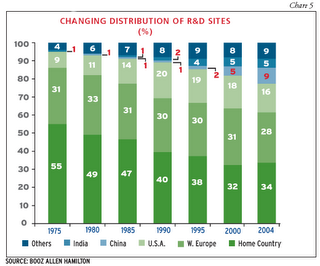Picture/Research crtsy: Booz Allen Hamilton, Global Services
Friday, June 30, 2006
Sunday, June 18, 2006

The winners for the 2006 Everest Grp. Outsourcing Excellence Awards!
Best BPO - Hughes and ACS
Best ITO - Vanguard Car Rental and Perot Systems
Best EU - Invista and Freeborders
Best Financial Services - Channel Life and Alfinanz
Best Healthcare - St. Vincent Health System and Eclipsys
Best Business Challenge - Citrix and HP Global Services
Best Offshore - Delta Airlines and Wipro
Best Partnership - BT and Accenture HR Services
source: www.Outsourcing-center.com , Everest Group
Thursday, June 15, 2006
reported by Global Services
India’s Tata Consultancy Services (TCS) is looking to buy Vertex, the outsourcing arm of U.K.’s United Utilities, in a deal valued at $800 million to one billion, the Times of India reported citing company sources.
Vertex – the company which has interests in back-office functions like customer services, human resources, procurement, finance and accounting – is perceived by the parent company as a non core business, and hence the decision to sell.
TCS already has an existing relationship with United Utilities, with the latter having signed a multiyear IT maintenance contract, the newspaper noted.
Vertex has about 9,000 employees across U.K., Ireland, Switzerland, U.S.A., Canada and India. The company reported a turnover of approximately $748 million in 2005-06 and a profit of approximately $38 million for the same time period.
Wednesday, June 14, 2006
According to a study by AMI-Partners, a US-headquartered market intelligence firm, Canadian small businesses are expected to spend about USD 9 billion for the IT related products and services in 2006. This reflects a 9 percent growth over the previous year. The firm expects a majority of the projected spend to be on storage, security, Internet, and IT services.
Amongst the findings, the total spend for basic support relating to computing, networking and software, as well as professional services such as IT management and consultancy, is expected to account for about 25 percent of the total IT spending by Canadian small businesses. The data back-up and disaster recovery are also given strategic importance by the Canadian small businesses. In 2005, these businesses spent about USD 359 million on storage components. In addition, enhanced data security is also amongst the most strategic issues.
Source: GlobalSourcingNow
Tuesday, June 06, 2006

India might still be the outsourcing apple in the eye of American businesses, but in Steve Jobs’ mind, the country looks too pricey these days.
US companies are even now offshoring work to India at the rate of knots, but the industry buzz is that the legendary founder of Apple pulled out of the world’s Back Office Central last week after facing rising costs and difficulties in hiring and retaining talent.
‘‘The turnover is high, and the competition for good people is strong.’’ The company feels it ‘‘can do it more efficiently elsewhere.’’ According to industry mavens, entry-level wages have climbed by as much as 13% annually from 2000 to 2004, while salaries for mid-level managers have gone up 30% annually during the same period to a median of $31,131.
Apple’s decision came even as the US behemoth IBM announced it would triple its investments to $ 6 billion over the next three years. IBM, which already employs some 42,000 people in India and is the country’s largest multinational employers, plans to hire thousands more, its CEO Sam Palmisano said during an analysts conference in Bangalore, the first time Big Blue has held such a meet outside the United States.
According to sources, the center had to be closed as it was not financially feasible. The company, however, will continue to provide technical support to its clients from a Bangalore, India-based third-party BPO services provider, TransWorks.
Still can't figure out what went wrong with India? Don't know - prob'ly Apple's tie-up with HCL Infosystems?
Whatever... The support would be no better and possibly worse if it was moved back. The training curve would need to start over again... The longer support stays in India, the better it gets...’’
Anyways Apple is "Thinking Differently ..."
source: ET/GlobalOutsourcingNow/Apple/Transworks/IBM
According to a study by the American Sentinel University, the chances of the US losing high-end IT jobs due to the fast development of IT and related industries in low-cost destinations such as India are much lesser than what was being reported by various private studies. IT offshoring is primarily limited to low-end occupations such as programmers, coders, and support specialists.
According to the study, high-end IT positions are growing at a pace which is at par with the levels experienced by the country during the boom period in the 1990s. A majority of the job losses that took place in the US during and after the recession period of 2000-01 were cyclical in nature and have been won back.
Though the low-end IT jobs have shown a marginal decline of 1.5 percent during the post-recession period of 2002-04, high-end IT jobs have shown a robust growth of 18.1 percent during the same period. Network system and data communication analysts lead the growth in the high-end IT group with a growth rate of 32.5 percent, followed by computer software engineers for systems software at 25.9 percent. The trend is supported by the fact that the total value of import of IT services in the US is less than 2.5 percent of software publishing and information services produced by the country.
The study titled, Offshoring of Information-Technology Jobs: Myths and Realities, defines low-end IT occupations as the jobs which are intensive, easy to codify, and require less face-to-face interaction. High-end IT jobs are the ones requiring advanced degrees in computer science or information systems and an understanding of management and business processes.
Sunday, June 04, 2006
The overall growth of the industry including both exports and the domestic market registered a 31% increase to reach $29.6 billion
Exports of Indian IT and IT enabled Services (ITeS) continued to grow for the fourth year in a row with an increase of 33% to touch $23.6 billion in ’05–06, according to reports by India’s industry association, Nasscom.
The overall growth of the industry including both exports and the domestic market registered a 31% increase to reach $29.6 billion according to the annual Nasscom report.
Though the projected growth in the exports for the year ’06–07 will continue to outstrip the growth in the domestic market, the industry is expected to meet its target of being a $60-billion industry by 2010.
Nasscom has also projected that exports will grow 27%–30% in ’06–07 to $29–$31 billion, while the overall industry is expected to grow 25%–28% to $36–$38 billion.
Of the total exports in ’05-06, IT software and services grew by 33% to $17.3 billion, while exports of the BPO industry grew 37% to $6.3 billion. For the year ’06-07, Nasscom has estimated that exports of software and services will increase to $21–$22 billion, while BPO exports will touch $8–$8.5 billion.
The domestic market for software is estimated to reach $6 billion in the current year from $4.8 billion in the previous fiscal year.

